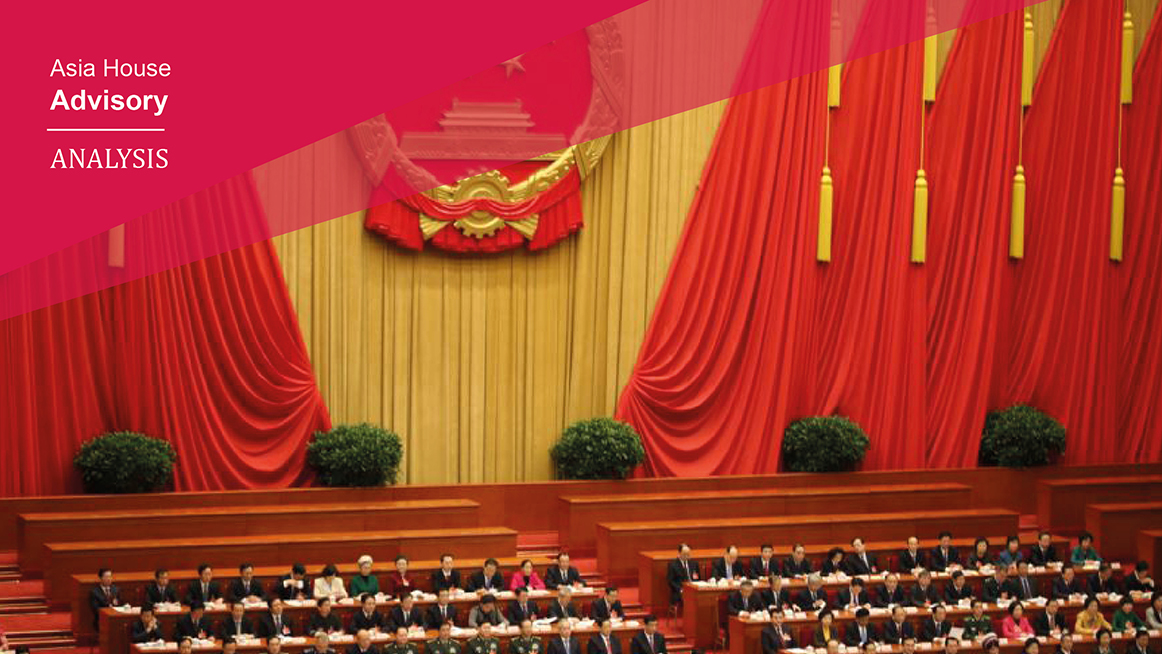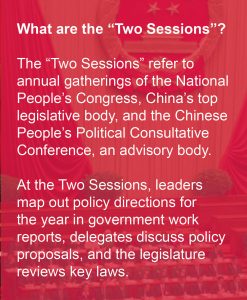Driving commercial and political engagement between Asia, the Middle East and Europe
Driving commercial and political engagement between Asia, the Middle East and Europe
Driving commercial and political engagement between Asia, the Middle East and Europe

Junni Ogborne, Asia House Advisor, Beijing, and Ed Ratcliffe, Head of Advisory
The recently concluded “Two Sessions”, China’s most important annual political meetings, were unlike any in history. Delayed from their usual slot in March, the meetings took on a truncated format which saw delegates wear masks or join via teleconferencing.
This year’s Two Sessions took on extra significance as the leadership faces major challenges at home and abroad.
Domestically, the government must contain health risks while stabilising an over-leveraged economy that is still being restructured. Unemployment is the top concern. Lingering lockdown effects, weak external demand, and decoupling have put pressure on export-dependent manufacturing sectors in particular.
Externally, China faces growing hostility over its handling of the pandemic, which has exacerbated frictions with the US and other countries.
These challenges come in a symbolic year supposed to mark China’s realisation of a “well-off society” ahead of the CPC’s centenary in 2021.
China’s leadership used this year’s Two Sessions to project confidence and mobilise its response strategy. The immediate focus will be on shoring up the domestic economy with stimulus targeted at jobs and consumption, while framing its anti-pandemic efforts as the success story of a responsible superpower.
This briefing highlights key takeaways from this year’s unusual Two Sessions, drawing on key government documents and statements by officials as well as broader trends reshaping China’s economy.
 1. No GDP target signals shift of priorities
1. No GDP target signals shift of prioritiesFor the first time since 1990, no specific GDP growth target was set at the meeting. Instead, the government will prioritise employment, business survival, and poverty alleviation.
In part, the decision reflects a weak economic outlook and suggests the government will accept slower growth than might have been expected.
More importantly, it represents a shift in mindset. The GDP target has been an organising principle of economic management for three decades. While it shaped growth incentives through the systems, it also led to untargeted spending and waste, as well as a disregard for the negative externalities of growth, namely environmental degradation. It remains to be seen whether the target is gone for good, but the lack of a hard target may allow the shift to a more sustainable growth model that China has been seeking.
As unemployment rises, the government unveiled a “jobs-first” fiscal stimulus package of nearly CNY 3.6 trillion (US$ 506 billion) and additional tax and fee cuts expected to save businesses CNY 2.5 trillion (US$351 billion) this year.
Large as it is, the support package is restrained compared to some other countries and China’s mega stimulus of 2008, which caused a serious debt hangover.
Reducing debt-driven risk has been a priority since 2017. This drive is being relaxed amidst the current slowdown. The target deficit-to-GDP ratio was raised above the conventional red line of 3 per cent to “over 3.6 per cent” – leaving room for more support if necessary. The local government bond quota, mainly used to fund infrastructure projects, was raised to CNY 3.75 trillion (US$527 billion), up from CNY 2.15 trillion (US$302 billion) last year. The government will also issue CNY 1 trillion (US$140 billion) of special treasury bonds. Monetary policy will be somewhat loosened, with guidance for banks to increase financing for small businesses in particular.
Aside from short-term relief for businesses, the stimulus is notable for aligning with long-term restructuring aims.
“New Infrastructure” is a priority for increased spending. Rather than roads and bridges, this refers to projects that support next-generation industries, such as data centres, 5G networks, AI, Internet of Things, and EV charging stations. New Infrastructure has become the policy buzzword of 2020 and the government is keen to get private capital involved. Shortly after the Two Sessions, Tencent announced a five-year plan to invest US$70 billion in technologies such as cloud computing and AI. Alibaba announced a similar three-year US$28 billion programme in April.
With a weak trade outlook and complex external environment, Beijing is doubling down on its long-term project of boosting domestic consumption.
In addition to safeguarding jobs and incomes, the work report pledged specific measures to support auto sales, elderly and childcare services, and the integration of online and offline consumption. The government will build e-commerce infrastructure to ease the flow of goods between the countryside and cities.
Early signs show that consumption is rebounding after sharp falls in March and April. COVID-19 has accelerated the shift to digital consumption, including online shopping, education, and e-healthcare. Some of these patterns will stick and be further reinforced by the New Infrastructure spending drive.
As international sentiment sours on China, the government is keen to restore faith among the business community. The Two Sessions saw new commitments to improve safeguards and market access for foreign investors.
Premier Li Keqiang pledged to “open our door wider to the world” and shorten the negative list for foreign investment. The NDRC, China’s top economic planning body, highlighted services, finance, manufacturing, and agriculture as sectors for liberalisation. The NDRC also said that hidden barriers to market access will be dismantled.
Hainan is another area to watch. Just after the Two Sessions, a blueprint was released to turn the island province into China’s first free trade port by 2035. This plan would create a free trade port larger than Hong Kong or Singapore and is personally backed by President Xi.
At a time of rising international tensions, the Two Sessions signalled no change from China’s firm stance on external affairs.
Despite some sharp rhetoric in recent months, China’s overriding foreign policy concern is to ensure a favourable environment for its continued development. However, this will be trumped by core domestic concerns if the two come into conflict.
Premier Li sought to defuse tensions with the US and vowed that the ‘Phase One’ trade deal will be implemented. Still, Beijing is preparing for an extended confrontation with Washington. This involves striving for self-sufficiency in critical technologies and bolstering ties with the EU, Japan, and ASEAN in particular.
Hong Kong has become another flashpoint in China’s external relations. The NPC passed a decision to draft a security law that will give Beijing greater powers in the territory. Aside from increasing uncertainty, as yet it is difficult to gauge what impact the forthcoming law (and international response to it) will have on doing business in Hong Kong.
Elsewhere, it was largely a continuation of existing policy directions. China reaffirmed its commitment to the multilateral trade system and realising the RCEP and China-Japan-South Korea FTA. Officials also pledged to continue pushing the Belt and Road Initiative (BRI). However, the initiative faces headwinds from COVID-induced disruption and debt distress in host countries, as well as waning support for large overseas expenditures at home. Expect some scaling back and a greater focus on safer projects as well as the BRI’s digital and healthcare dimensions.
The Two Sessions indicates that COVID-19 is accelerating policy trends shaping markets rather than fundamentally altering them. The Chinese government wants to build an economy more geared to consumption, digital/innovation, and broader “quality of life” measures such as health and environment rather than just quantitative growth. The vision is one of an economy that is more self-reliant but also more open.
These trends present increased risk but also opportunities for international business in China. The following are key considerations for international businesses who are engaged in China or are seeking greater engagement.
-Balancing supply chain risk and local presence
COVID-19 and decoupling have increased supply chain risks in China. MNCs should devise strategies that mitigate these risks while maintaining a presence in China’s market, which for many sectors will only grow in relative importance as the country recovers faster than elsewhere. Rising international tensions have also increased political risk – particularly for companies in sensitive or public-facing sectors.
-New impetus for growth in several key sectors
The government’s response to economic slowdown and decoupling has put an impetus for growth behind several key sectors. Promising areas include financial services and the automotive sector. Companies can also seek ways to tap into the spending drive on public health and New Infrastructure, such as offering tech-based healthcare and smart city solutions. European companies are well-placed to benefit as China-US ties deteriorate.
-Potential charm offensive
China is more than aware of rising global anti-China sentiment and will be seeking new ways to engage external actors and assuage historical obstacles or market risk concerns. This push to win over foreign investors provides a window to engage government and tap opportunities that were previously inaccessible due to formal or informal barriers.
-Watch this space
Investors should monitor developments as the activist agenda outlined during the Two Sessions drives change in markets. Looking ahead, the coming months will see a flurry of activity as ministries flesh out directives from the Two Sessions and the NPC embarks on a busy legislative schedule. Policymakers are also drafting China’s 14th Five-Year Plan, which will set economic priorities for 2021 to 2025.
Junni Ogborne, Asia House Advisor, Beijing
Junni is Asia House’s advisor based in Beijing where he helps organisations to navigate China’s political and business environment. Junni’s experience includes work as a research fellow at a leading non-governmental think-tank in China, director of public affairs at a Beijing-based consultancy, and in the political section of the EU’s delegation to China. He speaks English, Mandarin Chinese and Korean.
Ed Ratcliffe, Head of Advisory, Asia House
Ed leads the advisory practice at Asia House, advising organisations on government relations, economic developments and political risk. Prior to joining Asia House Ed led an advisory firm in Myanmar and worked across the APAC region for a public affairs consultancy based in Hong Kong. Ed began his career in Brussels, advising clients on engagement with the EU institutions.
The Asia House Advisory team provides bespoke consultancy services to help businesses understand their operating environment and engage the decision- makers that shape it. Our advisory services include:
– Research and intelligence services to identify regulatory obstacles, political drivers, and insights on your value chain
– Stakeholder engagement strategy development to help you understand decision-makers and power-brokers and how to engage them
– New market access and business development in highly-regulated sectors or those with significant public sector involvement
– Risk mitigation planning including political, business, integrity and supply chain riskCorporate reputation and profile-raising activities with government and private sector stakeholders
If you would like to discuss how we could support your business or aspirations in China please contact ed.ratcliffe@asiahouse.co.uk
